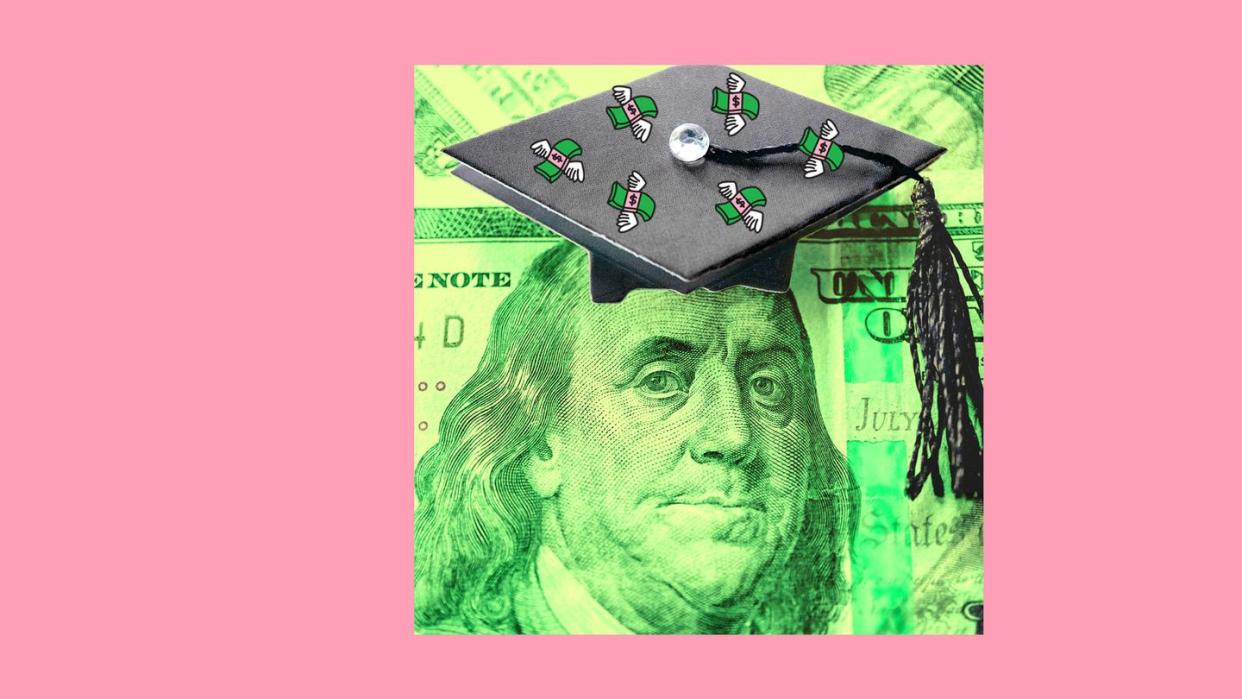40 Genius Money-Saving Tips to Help Pay Off Your Student Loan Debt

"Hearst Magazines and Yahoo may earn commission or revenue on some items through these links."
Whether you're about to graduate (congrats!) or you've been grinding in the workforce for a few years now, there's a good chance that you're spending a lotttt of time thinking about how to pay off your student loans. According to federal reserve data, more than half of college students end up taking on debt to finance their education. As of 2017, the average college debt among student loan borrowers was $37,584—I believe the scientific way to describe that sum is "a sh*t-ton of money," especially when you factor in interest.
Paying down your loan is both super daunting and super important for your financial future, which is why we connected with a handful of experts to learn their most creative tips for saving money. Even if you don't have student debt (lucky you), these genius money-saving tips will help you put a little extra cash in your pocket so you can start working towards your other financial goals, like building an emergency fund, buying a home, saving up for a dream vacation, or starting your own business.
If you haven't yet taken on any student debt but are considering it, head over here where we're breaking down the student loan crisis, the important questions you need to ask about your financial aid package, the shady college loan practices you should watch out for, and a guide to what all those financial aid terms even mean. It's complicated stuff, but take a deep breath, 'cause I know you got this.
Take a magnifying glass to your expenses
Dr. Lakisha L. Simmons, author of "The Unlikely AchieveHer: 11 Steps to a Happy and Prosperous Life"and an associate professor of analytics at Belmont University, explains that taking a close look at your expenses is *the* most important first step. "I always tell people to look at your expenses line by line," Dr. Simmons tells Cosmopolitan, "because you may be surprised where you're spending money that you don't even need to spend money."

Become a cord-cutter
Instead of shelling out each month for a cable subscription (spensy!), Simmons suggests paying only for your favorite channels and/or a few streaming services. I bet if you're extra nice to your sister's boyfriend's cousin, she'll even lend you her Netflix login.

Shop around for a cheaper phone plan
Your phone is pretty much your entire life at this point (same), but it's also a significant expense (also same). I know it sounds obvious, but what if you could find a cheaper plan? Simmons recommends Mint Mobile, which offers several low-cost plans, like the $15/month one that she's on. (Full disclosure: Simmons has a paid partnership with Mint Mobile.) There are other carriers like Tello, RedPocket, and Consumer Cellular that also offer low-cost phone plans.

While you're at it, shop around for a better auto insurance deal
Shopping for auto insurance is...not that exciting, so it's tempting to just renew with your current insurer every year—so easy! But hold up, because you might be leaving money on the table. "The first year you get your insurance, you shop around," Simmons says. "But the second, third, fourth year, you just stick with who you've been with. It's worth going back your second year, your third year and asking, 'are you giving me the best rate?' and then shopping around."

Break up with Whole Foods
Discount supermarket chains like Aldi or Grocery Outlet often have the same items as other stores, but for wayyy less money. "I shop at Aldi first before I go to a big brand name store," Simmons says. You may also want to check out the mom-and-pop stores in your neighborhood, as they often carry high-quality items and pantry staples for less than what you'd pay in a brand name store.

Meal planning = the key to grocery shopping on a budget
Before heading to the store, plan out your meals for the week and make a list of everything you'll need. This can help you cut down on impulse purchases, and reduce potential food waste.

Use coupons or rewards programs
I know, I know, cutting coupons is not the sexiest thing to do, but it will actually save you a ton of money. If whipping out an envelope of paper coupons at the checkout makes you feel weird (reminder, though, it shouldn't!), you can always use a coupon app.

Bike or walk instead of driving or taking car services
If it's possible to do so where you live, biking or walking instead of driving can save you a l-o-t of money. CNBC estimates that people who live in major metropolitan areas could save around $1,000 a year by biking to work instead of driving or taking public transit. Also, exercise! And being outside in the sunshine! Just please, for me, wear a helmet.

Live with roommates to cut down on housing costs
Living alone is great, but it can quickly get *very* expensive when you're the only one paying the rent, utilities, and other household costs. Finding roommates you can peacefully shack up with (emphasis on peacefully) can save you a lot of money, and who knows, they might become your BFFs.

Pack your lunch
If you're not WFH, picking up lunch from the to-go spot by the office is an easy choice—but those $12 grain bowls add up fast. You can save a lot of money by making food at home and bringing it with you. (This fits nicely with tip #6 about meal prepping.)

Quit your Starbucks habit
I agree, this one's a toughie. But those daily iced vanilla lattes add up, especially when you think about the annual cost. ($3.45 per drink x 5 days a week x 52 weeks = $897 a year!) Save money by making coffee at home or hitting up the machine at work, and save the Starbucks run for when you want to treat yourself.

Happy hour deals are your friend
Meeting up with a friend for "just one drink" can quickly become a costly endeavor. That's where happy hour comes in. If you duck out of work before 6 p.m., you and your crew can likely find a spot offering discounted bevvies *and* food—taking care of dinner too.

Organize a potluck with your besties
Get your vaccinated crew together for an outdoor potluck or picnic rather than making a res at a restaurant. If everyone contributes to the meal, it'll be way kinder to your wallet. Plus, it gives you a chance to flex your culinary skills—even if that just means boiling water for pasta. This is a judgement-free zone, you guys!

Cut back on alcohol
Between going out to your fave bar and buying bottles of vino for date night, it's way too easy to drop a ton of cash on booze. If you're trying to save money, try skipping drinks a few more nights a week than you normally would. It'll save you a few bucks and spare you the hangover, too.

Do your own nails
If you're a regular at the salon, you could easily be spending hundreds a year on your mani. There's nothing wrong with pampering yourself, but it's definitely more cost-effective to do your nails at home. One writer at GoBankingRates says she saves over $1,000 annually by buying salon-quality items and doing most of her mani-pedis at home.

Trim your hair yourself
Don't freak out. I'm not talking about DIY-ing a dramatic new style or anything like that. But you can cut down the number of trips you take to the salon each year if you do some maintenance in between appointments. Just make sure you have the right tools (this is super important!) and follow our guide.

Get your beauty treatments at a professional salon school
If DIY-ing a haircut sounds too scary, you still have another (cheaper) option. Make an appointment at a professional salon school where you'll get worked on by a student stylist who's being trained by an instructor.

Skip the expensive gym membership
According to MoneyCrashers, the average monthly cost of a gym membership is $58, though of course, this depends on where you live and what gym you go to. Based on that estimate, though, that's close to $700 a year. If you can, consider putting your gym membership on pause or canceling it altogether in favor of free workouts you can do at home. Just crank up your music and get moving.

Buy generic brands
When it comes to beauty, food, or household items, you can save a few dollars here and there by opting for generic or store-brand versions instead of name-brand ones. A $1.50 differential might not seem like much in the moment, but over time, the savings add up.

Audit your subscriptions at least once a year
Mary Beth Storjohann, an author, speaker, financial coach, and the founder of Workable Wealth, recommends combing through your subscriptions (think: Spotify, Thrive Market, even iPhone storage) every six months or so, and canceling any services you no longer use. "People sign up for stuff, and then they forget, or they forget to cancel before it renews again," she tells Cosmopolitan.

Take inventory of your paid apps
Just like with your other subscriptions, Storjohann recommends auditing the paid apps you have on your phone, and deciding if you're really getting your money's worth or if it's time to cancel before you get charged again.

Set firm money boundaries
Clear boundaries are a critical part of your financial health. You should get comfortable saying “no” to the friend who always asks you to pick up the tab and then "forgets" to Venmo you, or the one who convinces you to spend more than you can really afford on a night out.

Look for ways to reduce your utility bill
Simple changes like swapping out your lightbulbs for more energy-efficient ones or unplugging devices when you aren't using them can save you a decent amount of money throughout the year.

Visit the library
Before dropping $30 on the latest buzzy beach read, see if you can borrow a copy from your local library. Depending on where you live, your library might also offer non-book items available for checkout, like an air fryer, camping gear, bicycles, cooking equipment, drones, and other useful stuff.

Shop secondhand stores
Shopping consignment isn't only good for your wallet, it's also more eco-conscious. You can find high-quality designer pieces on sites like Depop and Poshmark, or head to a secondhand store in your 'hood to see what they have in stock.

Don't save your payment info
We've all been there: You're casually browsing online when you decide you actually *do* need that pair of bubblegum pink mules. How handy, your payment info is already saved! All you have to do is click "Buy Now." Create a little friction so giving in to impulse purchases is not that easy by not saving your payment info online.

Schedule major purchases strategically
If you have plans to buy something significant, like a new car, it can pay off to be thoughtful about when you buy it. October, November, and December tend to be the best months to buy a car, as dealers want to get the old models offloaded before the new ones come in, according to Bankrate. Similarly, if you're shopping for a new appliance, you might want to wait until a big sales holiday like Memorial Day or Black Friday.

Check your car's tire pressure
According to Car and Driver, underinflated tires could actually be costing you money. "Fuel economy is reduced by 0.2 percent for every 1 pound per square inch (psi) your car is underinflated. That means you could save up to 3 percent in gas mileage." Basically, you'll spend a little less on gas if you make sure your tires are properly inflated.

Downsize your apartment
Simmons made the decision to downsize from a 5-bedroom house in Nashville to a 2-bedroom apartment, and cut her housing costs in half. "It's worth considering the downsize for the short term until you really get your bearings with your finances, with your budget, and then you can go up from there," she explains.

Talk to your landlord about your rent
If moving isn't really an option for you (and I get it, moving is expensive!), you can always try to negotiate your rent down. Consider offering to pay several months upfront in exchange for a reduced rate, or sign a longer lease at a lower rate if you don't mind staying in the same spot for a while. Negotiating rent can be tricky, but you'll never know if you don't try, right?

Transfer your credit card balance (but be careful)
Transferring your credit card balance to a new card can help you save money, but you should only do this if you're confident that you can pay the balance. "I don't necessarily encourage balance transfers unless you know that you're going to pay it off, but a lot of times you can transfer that balance to another card and get it paid off and save yourself a few hundred dollars," explains Storjohann.

Use a card card that offers rewards (again, carefully!)
I can't say it enough: You really need to be careful when it comes to credit cards, as they make it pretty easy to rack up debt. If you feel confident in your ability to pay off your bill every month, then see if you can get approved for a credit card that offers travel rewards or cashback to make your spending work harder for you.

Buy in bulk
If you've got storage space, buying bulk items will definitely save you money. It's a little counterintuitive since you'll spend more upfront (so yeah, initially it might feel like a hit to your bank account) but the cost-per-unit will be less in the long run. Just make sure you're only buying stuff that you'll actually use or eat.

DIY your cleaning products
With just a few ingredients you probably already own (white vinegar, baking soda, rubbing alcohol, and essential oils), you can make your own cleaning products. It's a whole lot cheaper than spending $5 or more on a single bottle of cleaning solution.

Guess what? Your medical bills are negotiable
Many people don't realize that they can negotiate their medical bills. According to CNBC, people facing high healthcare costs can ask for an itemized bill, apply for Medicaid or other subsidized insurance, and/or contact the healthcare provider or hospital to ask for a reduction. It may not work for every bill, but seriously, it's worth a shot—you could save thousands of dollars!

See if you can switch to a generic prescription
Another healthcare-related cost hack: If you're paying for a brand-name prescription, it's worth asking your doctor if they can switch you to a generic version or a lower-cost alternative instead.

Make your next vacay a camping trip
Staying on a budget doesn't mean you have to miss out on all the vacations with your besties. Instead of shelling out for a luxe hotel, save money and connect with nature by sleeping under the stars for a weekend. If you don't already have camping equipment, see if you can rent or borrow it for cheap.

Do basic car maintenance yourself
When it comes to simple auto tasks like changing your oil or replacing a broken headlight, you can def tackle 'em yourself thanks to the wonders of YouTube. Watching a few videos and getting a bit of grease on your shirt? Way cheaper than going to the mechanic.

Same thing with home maintenance
As with your car, you can DIY basic home repairs. Things like leaky faucets and squeaky doors can be tackled with the right set of tools and some determination, no handyman necessary. How-ev-er, that mindset does not apply to certain jobs, like electrical installations, that require a professional.

See if your bank is willing to waive any fees
You might be able to save a few bucks by asking (nicely) for your bank to waive things like overdraft or late fees. If you've been a reliable customer for a while now, they might be willing to consider the request if you call and politely explain your circumstances.

You Might Also Like
